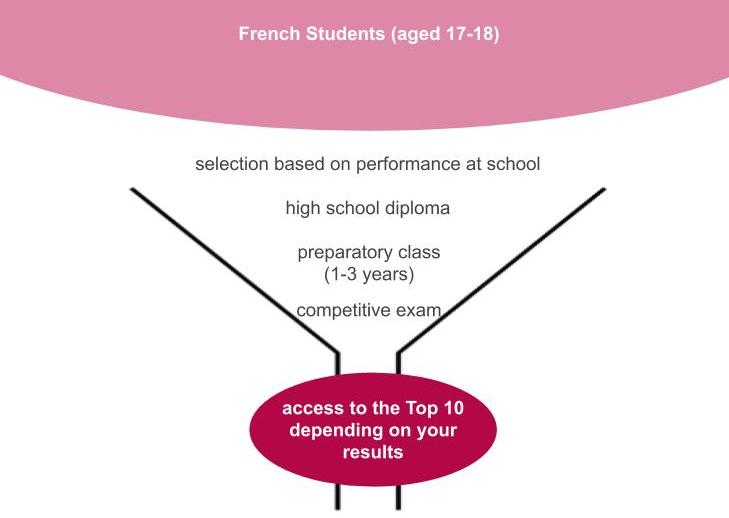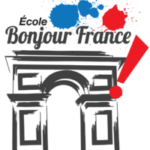Do You Need French to Apply to a “Grande École”?
Quick answer is “no and yes”! 
For more, read the article below or go straight to your favorite part ✌
- What is a “grande école”?
- 6 good points about “grandes écoles”
- Top 10 of French “grandes écoles” + will you need French there?
- How do you get into a “grande école”?
Are you dreaming of living and working in France, maybe in a famous company like Dior or a hotel from Accor Group?
By the way, since 2016, foreign graduates can now work in France!
Big French companies praise “grandes écoles” a lot. These specific institutions provide very high education level and they are separate from, but parallel and often connected to the main framework of the French public university system.
But hold on, let’s talk first about a fun fact
aller à la grande école (1) ≠ faire une grande école (2)
(1) kids aged 6 going to elementary school
(2) students in their early twenties going to a “grande école”
Oups… Watch your words! 
What is a “grande école”?
The name appeared during the Renaissance to refer to… Buildings where you could attend university classes. “Grandes écoles” indeed are big constructions, aren’t they? So it makes sense to focus on the container before the content.
Of course, the first post graduate schools in France were Royal Schools: engineers and military academies (17th-18th). It is just at the end of Early modern european period that “grandes écoles” were also meant for engineering and business education.
Today, there is no official list of “grandes écoles” in France. In 1992, the Ministry of Education described them as having:
- a selection based on a competitive exam
- a high education level
There are 3 kinds of “grandes écoles”:
- made for senior civil servants
- civil: écoles normales supérieures (ENS), Mines ParisTech, ENA, etc.
- military: École polytechnique (X), École navale, Saint-Cyr, etc.
- dedicated to business and management education : according to the BCE, French institution in charge of the competitive exam, there are 21 business schools but we will focus here on the Top 10.
By the way, did you know that 5 French “grandes écoles” are in the Financial Times Global MBA Ranking 2020? 4 of them are in our top 10 below: HEC Paris, EM Lyon Business School, Edhec Business School & Essec Business School.
Not only business schools aim at training the best students in business and management but they also offer lifelong learning to business owners and executives (see MBAs at ESSEC).
- other institutions : selective and challenging institutions such as engineering schools, Sciences Po Paris, Paris-Dauphine, etc. were also influenced by “grandes écoles”.
⛔ Lets’ take a break here to talk about the hidden face of “grandes écoles”
Since they are selective and challenging – how ironic in the nation of equality … – “grandes écoles” are definitely not open to any French student! (Take a look at the drawing below).
So we can’t help but wondering if they are exclusive to people who can afford them? To people gifted with the perfect background leading them to the top jobs in the top companies?
Of course, “grandes écoles” are expensive and even before making it, students who can pay for private lessons definitely have a head start on the others!
Criticisms do exist about “grandes écoles” (check this abstract about “Les Grandes écoles, système dépassé ou produit d’avenir ?” – more in the French version) but as far as I am concerned as a French citizen and a language teacher willing to treat all languages and cultures equally, let’s admit that French “grandes écoles” definitely have a typical way of thinking, organizing, managing and running business.
They have their own vision on how to deal with the economy and so will the human connections be impacted. And by exporting themselves out of France, they also spread – and impose ? – that vision.
Otherwise, why would ESSEC go in Africa after investing in Asia? Why would many other French “grandes écoles” hurry to invest in Morocco, Senegal or Ivory Coast (see this article in French)? By the way, let’s not forget that the age of colonialism remains a very sensitive subject in France (check here and here)…
 How would French people react if academic institutions from asian or african countries would open schools in France?
How would French people react if academic institutions from asian or african countries would open schools in France?
And by the way, who run the “grandes écoles”? Who decides the contents? The strategy? The vision for future? How do they change – if they change -? Are the students or other publics involved in the process?
Global warming and environmental impact, consequences of Covid-19, overconsumption: we already face some of the big changes we feared the most.
Do the “grandes écoles” – and not only the French ones ! – really fit to help us prepare for what comes after? Aren’t these the final hurdle which lead all of us to the present point: short term economic vision with profitability at all costs (including frequent unacceptable working conditions), damage of natural resources, etc., so many reasons “why we should bulldoze the business school”, reported The Guardian in 2018?
I hereby ask questions because I have no answer and also because it is up to you, if you still wish to attend a French “grande école”, to find answers 
6 good points about “grandes écoles”
Now that we talked about the story behind “grandes écoles”, let’s talk about how students benefit from them!
Apart from the cost, any French ambitious student would be more than happy to study in a “grande école” and here is why:
- selective therefore prestigious, the “grandes écoles” are the must-do especially if you dream to work in hotel trade, luxury industry, restauranting, culture, art, design, pharmaceuticals, etc.
Look below how selective a “grande école” is and imagine how you will be considered as a non-French being able to make it!

- high quality teaching staff and resources to help students: excellent working and living conditions on campuses (see example at EDHEC Lille). Students get used to networking so it helps for the future!
- but at the same time, students are encouraged to take projects up: get involved in charities (see examples at TBS), start a business, anything to be able to learn from action! It is also easy to take a gap year in order to go more into your personal project, whatever it might be, in depth.
- by the way, the “grandes écoles” make it really simple for French students to go abroad starting by providing them with challenging methods to learn foreign languages.
- high chances to find golden opportunities (internship, first job, etc.) thanks to the alumni networks, for example 45 000 alumnis at Skema business school.
- frequent dual-degrees provided, for example:
- Dual master’s degree: Master of Management from NC State University + MSc Global Luxury and Management from Skema
- Triple Master LOYOLA X SKEMA X LMU: MBA from Loyola University + master of science in Management from LMU + “Grande École” degree from Skema
Let’s take a break here to name some French “VIPs” who graduated from a “grande école” 
- top executives
- Christophe Bonduelle (EDHEC), CEO of Bonduelle
- Michael Burke (EDHEC), CEO of Louis Vuitton
- Jean-Philippe Courtois (SKEMA Business School), Executive Vice President and President, Global Sales, Marketing and Operations for Microsoft
- François Gay-Bellile (NEOMA), General Manager of Coca-Cola European Partners France
- Wilfried Guerrand (NEOMA), Executive VP in charge of Métiers and Data & IT systems at Hermès
- Thierry Guibert (NEOMA), General Manager of Lacoste
- Dominique Loiseau (BSB – Executive Program), CEO of Bernard Loiseau gastronomic restaurants
- François-Henri Pinault (HEC), CEO of Kering (Gucci, Yves Saint Laurent, etc.)
- politics: François Hollande (HEC), former France President
- youtuber: Pierre Croce (BSB)
- singers
- Irma (ESCP Business School) – youtube channel
- Jean-Jacques Goldman (EDHEC) – youtube channel
- Orelsan (EM Normandie)
- former athletes
- Sébastien Chabal and Frédéric Michalak (EM Lyon), former rugbymen
- Pascal Gentil (ESSEC), former Taekwondo national team leader
- Marie-José Pérec (ESSEC), former athlete (and said to be one of the best French athletes since WW2!)
Top 10 of French “grandes écoles”
+ will you need French there? 
Classes in “grandes écoles” can be in English and French or only in English with French courses provided to international students. Basically, each “grande école” is different and so are the degrees!
⚠ Bear in mind that if you wish to get more skilled in a specific master’s degree for example, French will probably be required at to some point
See example in Skema’s FAQ: “Do I need to speak French to apply? No. SKEMA’s MSc and BBA programmes are designed for international students – they are taught and marked entirely in English. French is not required at all. To help you settle into your new lives in France, the school offers foreign students free French classes. For mastères spécialisés programmes, you need to speak French to apply.”
Anyway, if you come to study here in France with French students, you will soon be expected to reach A2 and then B2 at last, especially if you wish to work for a French company and / or settle down here.
As far as the “grandes écoles” campuses out of France are concerned, it is impossible to know if French language is privileged in class and for which degree. You will have to check with each school beforehand.
Remember that if you graduate a dual-degree from a French “grande école”, you really can’t miss the opportunity to highlight your level in French whatever it may be due to the courses provided by the “grande école” or your personal commitment!
You will find below the Top 10 French “grandes écoles” with some examples of degrees and the language required
| HEC* | More about HEC & Asia, HEC & Americas, HEC & Middle East / Africa | |
| ESSEC | Global BBA in France, Singapore & Morocco Master in Management in France, Singapore & Morocco | |
| ESCP BS* | Bachelor in Management (BSc) in Paris, Berlin, London, Madrid, Turin Pre-Master year studies for the Master in Management in Paris ( Master in Management in the 6 ESCP campuses List of postgraduate specialised masters ( | |
| EM Lyon* | More about incoming & Double Degree Students (Undergraduate) More about EM Lyon campus in Casablanca 20 degrees in different locations ( | |
| EDHEC | BBA in Lille & Nice ( List of worldwide academic partners | |
| Audencia Business School* | More about Audencia’s strategy abroad | |
| Grenoble école de management | More about Grenoble EM’s strategy abroad | |
| SKEMA Business School* | List of programs and degrees ( | |
| NEOMA Business School | List of programs and degrees ( | |
| TBS | List of programs and degrees ( |
Lets’ also add Burgundy School of Business (BSB) ranked 15 and located here in Dijon but also in Lyon and Paris. Many programmes are delivered 100% in English with French classes available to international students.
How do you get into a “grande école”?
1) Selection based on a competitive exam after a preparatory class (1-3 years) – for French people and French-speaking people
After high school diploma*, called “baccalauréat”, French students aged 17-18 (check here for more about Education in France), can attend a “classe préparatoire” (preparatory class) where they will be called préparationnaires during 1 to 3 years.
*If, and only if, they were selected beforehand from their performance at school!
Since the 18th, this special class prepares students for the “concours d’admission aux grandes écoles”. Students can choose between Literature, Science and, since 1920, Economics and Commerce called “EC” or “HEC” but students call it “prépa épices” (spicy prep? ).
At this stage, things start getting serious…
Life in “prépa” is very stressful so it is an excellent opportunity to learn dealing with the pressure, find a good work method and also focus on working really hard to read a lot of classics. Indeed, maybe you know how important it is to be able to debate and build reasoning in French education system…
There, students get prepared for the yearly competitive exam leading to the “programme Grande École” of 21 French business schools (and 3 other schools). All of them deliver masters’ degrees.
If failed, they can try again twice, it depends if they are satisfied or not with their results at the written and oral parts* of the exam. Also, students from French-speaking countries like Morocco or Senegal go for the same competitive exam as native students.
*oral part of the exam was cancelled in 2020 due to Covid-19 pandemic… A drama for lots of students who relied on it to expect a better result!
⚠ By the way, native or not, you definitely need to be perfectly fluent in French to be able to attend a “classe prépa”. Remember that even most French people can’t make it!

Students in “prépa” are not alone. They have access to useful information and advice thanks to media like Mister Prépa, founded by Benjamin Hautin, former student in “prépa” and a team of students
To apply for a “classe prépa”, visit websites below and follow instructions
(⚠ deadlines may have changed when you will read this article!)
- check information on your local Campus France agency
- application open from mid-November to March on Pastel.diplomatie.fr
- then you will have to follow instructions on Parcoursup.fr (French version only…) from end of January to mid-March
- after that, don’t forget to apply for the competitive exam before the end of your “classe prépa”! Follow instructions on Concours-bce.com (French version only…).
2) Selection based on grade – for French people and non-French people
French students who did not attend a “classe prépa” nor have the competitive exam but graduated a bachelor’s degree at university for example can apply to a “grande école”. This is called “admission sur titre”.
Places are limited so they need to prepare their records! Specific honors may be required so as 2 or 3 reference letters and you definitely need to prove your motivation during the interview with the jury.
Non-French students face the same process but each “grande école” is free to require more, for example B2 level in French.
Check requirements for the Master in Management at Skema and Neoma
To apply for a selection based on grade as a non-French student, follow instructions on Join a School in France
3) Access thanks to an academic partner in your country – for non-French people
The easiest way to spend a semester or a year (or more!) in France and maybe get a degree from a “grande école” seems to apply for exchange programs your university may have with French “grandes écoles”.
Check examples of partnerships at HEC, Grenoble Ecole de management or BSB
